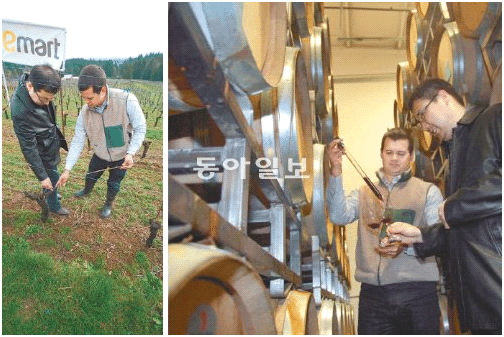
Market Information > Food News Clipping
Food News Clipping
March 25, 2013
2013.03.25
1. MARKETING ISSUES
Lotte Mart and Lotte Department Store Show Good Example of the Impact of Gov¡¯t Restrictions [Korean, OSY]
http://www.hankyung.com/news/app/newsview.php?aid=2013032491331
Summary: While Lotte Department Store reported 2.7 percent growth of sales during January and February this year, Lotte Mart¡¯s sales declined by 8.5 percent. Market analysts agree that the poor performance of Lotte Mart in comparison to Lotte Department Store is tightened government restrictions on hypermarket industry. New government regulation has mandated hypermarket stores to close for minimum two days per month.
How E Mart can Sell an imported American Wine in Korea at a Similar Price as the Retail Price in the U.S.? Really? [Korean, OSY]
http://news.donga.com/3/all/20130319/53824783/1

2. OTHER MISCELLANEOUS ISSUES
ROKG Confirms Dumping Exports by Chinese Wood Panel Suppliers ¡¦ Follow-up Investigation may Introduce Anti-dumping Import Tariff on Chinese Wood Panels in the Second Half ¡¦ The U.S. has Already Ruled 27.16% of Temporary Anti-dumping Import Tariff on Chinese Wood Panels on February 27, 2013 ¡¦ Industry is Concerned about Possible Retaliation Measure by China on Korea-the U.S. Collaboration [Korean, OSY]
http://news.donga.com/3/all/20130321/53883417/1
Summary: Trade Committee under the Korean Ministry of Knowledge & Economy decided that China had been exporting wood panels at under fair market price (dumping) on February 21. The committee will decide the amount of anti-dumping import tariff on Chinese wood panels after follow-up damage investigation. Korean government¡¯s action on this issue was initiated after the U.S. government started an investigation in October 2012. The U.S. Department of Commerce recently ruled 27.16 percent of temporary anti-dumping import tariff on Chinese wood panels on February 27, 2013. Traders commented that China may take a retaliatory action against Korean exporters if Korean government investigation result in anti-dumping import tariff. Chinese products currently account for 38 percent of wood panel market in Korea.
KFDA Briefing to President Park Proposes Stronger Food Safety Regulations [Korean, OSY]
http://www.hankyung.com/news/app/newsview.php?aid=2013032129271
Summary: Korea Food & Drug Administration (KFDA) gave the first official briefing to President Park on March 21. KFDA stressed that eradication of unsafe foods from the market would be its top priority. For this, KFDA planned to introduce stronger food safety regulations in the coming months. Key regulatory initiatives proposed in the briefing were:
1. Revision of ¡®Children Food Safety Management Act¡¯ which will ban sales of food in retail outlets within the school zone that do not meet safety standards.
2. Revision of ¡®Food Sanitation Act¡¯ to increase penalty fee ceiling on food safety violations up to 10 times of the sales.
3. Introduction of mandatory traceability requirement on food and agricultural products. Pilot system will be constructed on baby & children foods in June, 2013.
4. Mandating official import registration on imported food products purchased by individuals from foreign Internet on-line shops.
5. Introduction of ¡®Restaurant Safety Grading System¡¯ which will issue official safety grades to restaurants for public posting.
¡° The U.S. and Korea Have Started to Share Thoughts Each Other¡±, Patrick Myer, International Trade Manger, ODA [Korean, OSY]
http://news.donga.com/3/all/20130319/53824818/1
Summary: Patrick Mayer of ODA said in an interview with DongA Newspaper in Portland, Oregon on March 12 that ¡°The United States and Korea have started to share thoughts each other. Increase trade with Korea has generated bigger interest in Oregon on Korean culture¡±. He added that ¡°more Americans are embracing the idea that we need to better understand the Korean market and we need to put additional efforts to better communicate with Korea¡±. For Oregon, blueberry and nuts are key agricultural products. The 40,000 farms in Oregon sells about one third of their products to export market. For Korea, wine and blueberry are main products imported from Oregon. Mr. Mayer said ¡°KORUS FTA has generated increased exports to Oregon agriculture. Further reductions in Korean import duty under the FTA will return bigger profits to Oregon farmers in the coming years¡±. Mr. Mayer said in clear Korean ¡°Gunbae (Cheers)¡± at the dinner. Obviously he is one of Oregonians who understands Korea.

The information in this report was compiled by the Agricultural Trade Office (ATO) at the U.S. Embassy in Seoul, South Korea. The press summaries contained herein do NOT reflect USDA, the U.S. Embassy, or other U.S. government agency official policy or view point. U.S. food exporters can learn more about market opportunities in South Korea by reviewing ATO Seoul's Exporter Guide and other reports available at www.fas.usda.gov by clicking on "attaché report".
Agricultural Trade Office, U.S. Embassy - Seoul
Tel: 82-2-6951-6848 Fax: 82-2-720-7921
Email: atoseoul@state.gov